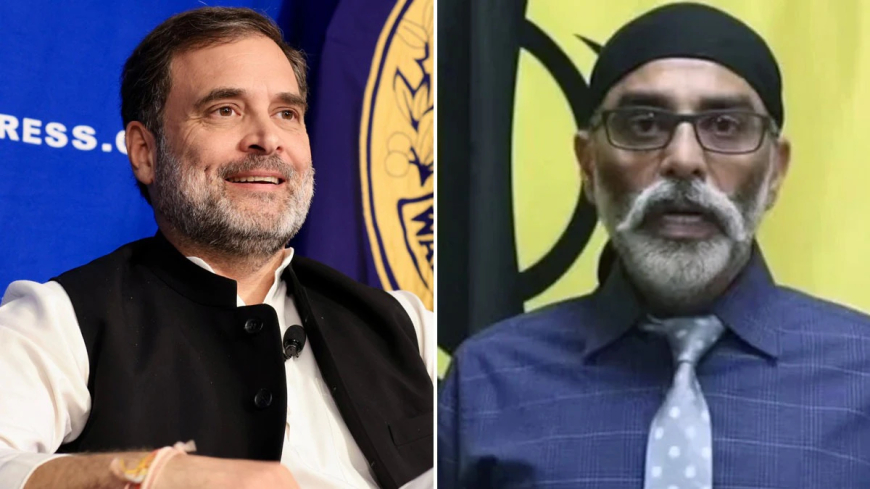Rahul Gandhi's Sikh Comment Sparks Khalistan Demand by Pannun
n recent political developments, Pannu, a known Khalistani supporter, has utilized a statement by Rahul Gandhi to bolster the Khalistani cause. This has sparked debates over the potential implications of Gandhi's words, especially in the context of the Sikh community's position in India. The question arises: what did Rahul Gandhi actually say, and how has it been manipulated by groups like Khalistani supporters to further their agenda?

Analysis of Rahul Gandhi’s Statement and its Controversial Usage by Khalistani Supporters
Introduction: In recent political developments, Pannu, a known Khalistani supporter, has utilised a statement by Rahul Gandhi to bolster the Khalistani cause. This has sparked debates over the potential implications of Gandhi's words, especially in the context of the Sikh community's position in India. The question arises: what did Rahul Gandhi say, and how have groups like Khalistani supporters manipulated it to further their agenda?
Rahul Gandhi’s US Tour and Political Statements:
Rahul Gandhi is on a tour in the United States, attending various seminars and interviews. His meetings with US lawmakers and officials have garnered attention from Indian political parties and media. During his tour, a photograph surfaced of Gandhi meeting controversial US Congresswoman Ilhan Omar. Omar, known for her anti-India remarks, including comments on Kashmir and Article 370, has been criticized in India for her stance on these issues. This meeting alone led to significant backlash from Indian political figures.
However, the controversy heightened when Rahul Gandhi made a statement during one of his interactions, questioning whether Sikhs in India could freely practice their religion. He reportedly said, “The fight in India today is whether a Sikh can freely wear his turban, visit a Gurdwara, and live his faith without obstruction.” This remark has sparked widespread debate and criticism, especially as it implies a fundamental challenge to the religious freedom of Sikhs in India.
How Khalistani Supporters Are Using Gandhi’s Statement:
Gurpatwant Singh Pannu, a prominent figure in the Khalistani movement, quickly capitalized on Gandhi's statement. Pannu, and others like him, have used it to justify their long-standing claim that Sikhs are oppressed in India and that the demand for Khalistan is, therefore, valid. Pannu's argument essentially asserts that Gandhi’s words have “proven” the legitimacy of Khalistan’s demand for a separate Sikh state.
This manipulation of Gandhi’s statement by Khalistani supporters isn't new. Proponents of Khalistan frequently attempt to exploit any perceived discontent or political statements that can be twisted to fit their separatist narrative.
Ground Reality in India:
Contrary to the portrayal by Pannu and his supporters, the reality in India is far different from the scenario depicted in their narrative. India, home to a significant Sikh population, has seen its political leaders, including Prime Minister Narendra Modi, regularly participate in Sikh religious ceremonies, visiting Gurdwaras, and emphasizing the importance of Sikh traditions. India has a long history of Sikh representation in politics, bureaucracy, sports, and business sectors.
Several political leaders, including the Chief Minister of Uttar Pradesh, have made statements honouring Sikh heritage. For example, in 2021, the UP Chief Minister declared Sahibzada Day, recognizing the contribution of Sikh Gurus. These actions directly contradict the notion that Sikh traditions are under threat in India.
Political Implications of Rahul Gandhi's Statement:
Rahul Gandhi’s statement, made on an international platform, has sparked criticism from several Indian political parties. Many argue that Gandhi’s remarks are out of touch with the reality in India, where religious freedom is constitutionally guaranteed. By making such statements, particularly on foreign soil, Gandhi may have unintentionally provided ammunition to groups like the Khalistani movement, which thrive on creating narratives of oppression and division.
Strategic Timing and International Dynamics:
An important question arises: why did Rahul Gandhi make such a statement now? His US tour comes at a critical juncture, just ahead of key international summits such as the United Nations General Assembly (UNGA) and the BRICS Summit. Initially, there were speculations that Indian Prime Minister Narendra Modi would attend the UNGA, but Modi has opted out, sending External Affairs Minister S. Jaishankar instead. On the other hand, Modi is expected to attend the BRICS Summit in Russia in 2024.
Interestingly, while Rahul Gandhi was holding meetings with US lawmakers, the US Ambassador to India made a noteworthy statement. The ambassador expressed that the US wants a "Best Friends Forever" (BFF) relationship with India. This comment reflects the strategic importance of US-India relations, even as India balances its diplomatic engagements with both the US and Russia.
Conclusion:
The controversy surrounding Rahul Gandhi’s statement highlights the complexities of international politics, domestic narratives, and separatist movements. While Gandhi’s remarks have stirred debate, their use by Khalistani supporters like Pannu raises questions about how political statements can be manipulated for divisive agendas. As India navigates its diplomatic ties with major global players like the US and Russia, such controversies will undoubtedly shape the country’s political discourse, both domestically and internationally.













